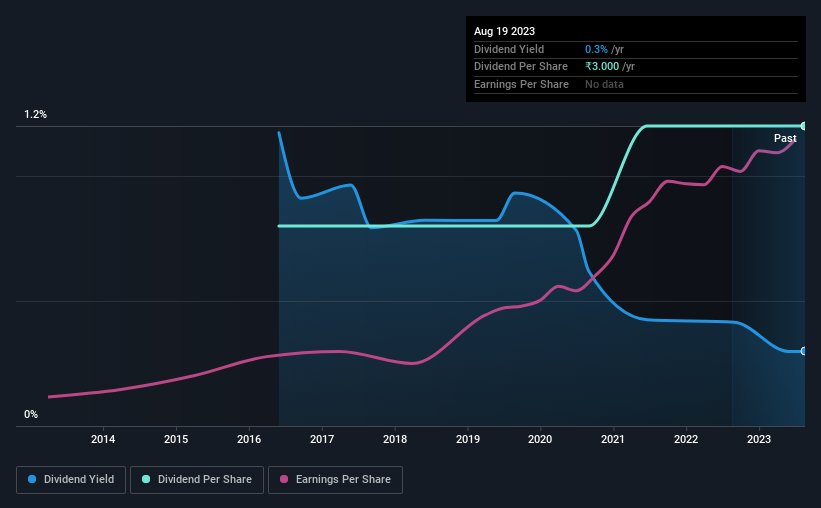- India
- /
- Commercial Services
- /
- NSEI:MALLCOM
Mallcom (India) (NSE:MALLCOM) Is Paying Out A Dividend Of ₹3.00

Mallcom (India) Limited (NSE:MALLCOM) has announced that it will pay a dividend of ₹3.00 per share on the 11th of October. The dividend yield is 0.3% based on this payment, which is a little bit low compared to the other companies in the industry.
Check out our latest analysis for Mallcom (India)
Mallcom (India)'s Earnings Easily Cover The Distributions
While yield is important, another factor to consider about a company's dividend is whether the current payout levels are feasible. However, Mallcom (India)'s earnings easily cover the dividend. This means that most of what the business earns is being used to help it grow.
Over the next year, EPS could expand by 35.1% if recent trends continue. Assuming the dividend continues along recent trends, we think the payout ratio could be 4.0% by next year, which is in a pretty sustainable range.

Mallcom (India) Doesn't Have A Long Payment History
It is great to see that Mallcom (India) has been paying a stable dividend for a number of years now, however we want to be a bit cautious about whether this will remain true through a full economic cycle. Since 2016, the annual payment back then was ₹2.00, compared to the most recent full-year payment of ₹3.00. This means that it has been growing its distributions at 6.0% per annum over that time. Investors will likely want to see a longer track record of growth before making decision to add this to their income portfolio.
The Dividend Looks Likely To Grow
Investors who have held shares in the company for the past few years will be happy with the dividend income they have received. It's encouraging to see that Mallcom (India) has been growing its earnings per share at 35% a year over the past five years. Rapid earnings growth and a low payout ratio suggest this company has been effectively reinvesting in its business. Should that continue, this company could have a bright future.
Mallcom (India) Looks Like A Great Dividend Stock
Overall, we like to see the dividend staying consistent, and we think Mallcom (India) might even raise payments in the future. The company is easily earning enough to cover its dividend payments and it is great to see that these earnings are being translated into cash flow. Taking this all into consideration, this looks like it could be a good dividend opportunity.
Investors generally tend to favour companies with a consistent, stable dividend policy as opposed to those operating an irregular one. However, there are other things to consider for investors when analysing stock performance. For instance, we've picked out 2 warning signs for Mallcom (India) that investors should take into consideration. If you are a dividend investor, you might also want to look at our curated list of high yield dividend stocks.
New: Manage All Your Stock Portfolios in One Place
We've created the ultimate portfolio companion for stock investors, and it's free.
• Connect an unlimited number of Portfolios and see your total in one currency
• Be alerted to new Warning Signs or Risks via email or mobile
• Track the Fair Value of your stocks
Have feedback on this article? Concerned about the content? Get in touch with us directly. Alternatively, email editorial-team (at) simplywallst.com.
This article by Simply Wall St is general in nature. We provide commentary based on historical data and analyst forecasts only using an unbiased methodology and our articles are not intended to be financial advice. It does not constitute a recommendation to buy or sell any stock, and does not take account of your objectives, or your financial situation. We aim to bring you long-term focused analysis driven by fundamental data. Note that our analysis may not factor in the latest price-sensitive company announcements or qualitative material. Simply Wall St has no position in any stocks mentioned.
About NSEI:MALLCOM
Mallcom (India)
Engages in the manufacture and sale of personal protective equipment in India and internationally.
Proven track record with adequate balance sheet.
Similar Companies
Market Insights
Community Narratives



